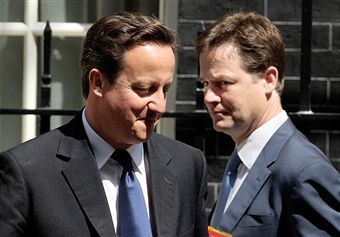 If you strain your ears, and listen very carefully above the din of the phone hacking
scandal, then you may just hear Nick Clegg’s voice wafting across the Channel from Paris. Our Deputy Prime Minister is on the Continent today, delivering a speech that, in other circumstances, might have made more of a splash.
This is, after all, a speech in which he stands up for the eurozone, and chastises those eurospectics — some of them within the coalition parties — who are eagerly anticipating its
collapse. Or as he puts it himself:
If you strain your ears, and listen very carefully above the din of the phone hacking
scandal, then you may just hear Nick Clegg’s voice wafting across the Channel from Paris. Our Deputy Prime Minister is on the Continent today, delivering a speech that, in other circumstances, might have made more of a splash.
This is, after all, a speech in which he stands up for the eurozone, and chastises those eurospectics — some of them within the coalition parties — who are eagerly anticipating its
collapse. Or as he puts it himself:
“A successful eurozone is essential for a prosperous UK. So there is no room for Schadenfreude here, no place for wagging fingers. Countries like the UK should not see ourselves as spectators, watching from the wings, triumphalist, complacent, as if Europe’s economic woes are a eurozone problem, rather than a problem for all of us. As if it is enough to put your own house in order, but then stand by and let the neighbourhood crumble.”
Although Clegg doesn’t go so far as to commit more taxpayers’ cash to countries like Greece, the tone of his address still contrasts with that adopted by David Cameron. Here’s how the Prime Minister spoke of the eurozone in his interview with James and Fraser from the latest issue of the mag (an extended version of which we posted on Coffee House yesterday):
“Cameron starts with the premise that the eurozone countries will do what it takes to keep the single currency alive. ‘No one in Britain, however sceptical they are about the euro — and they don’t come much more sceptical than me — should have any doubt about the immense commitment there will be from other European countries to make the euro work,’ he says. ‘We would be kidding ourselves if we thought somehow they’re sitting around thinking, gosh it’s not going very well, how are we going to get out of this one? That’s not what they’re doing. To them the euro is absolutely central to their vision of their membership of Europe — and they will, I think, do pretty much anything to make that work.’ The eurozone, he adds, will have to move ‘towards much more single economic government’. And in that, crucially, he sees a great chance to renegotiate Britain’s relationship with the European Union. Or, as puts it in a slow and deliberate way, ‘There will be opportunities for Britain to maximise what we want in terms of our engagement with Europe.’”
That a Lib Dem and a Tory differ on Europe is no great surprise. But it’s still another example of the two parties making more of their differences than their commonalities. From the NHS to phone hacking to this, the mission to distinguish the yellow and blue halves of the coalition is continuing apace.






Comments